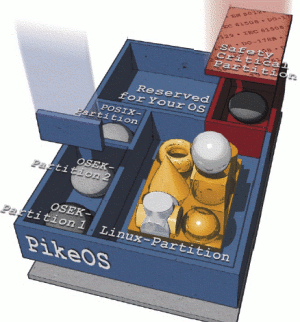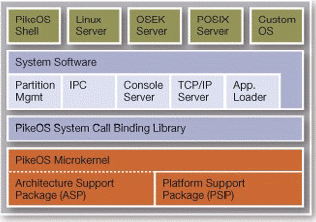Sysgo aims major distro update at mil/aero
Sep 19, 2005 — by LinuxDevices Staff — from the LinuxDevices Archive — 8 viewsSysgo will ship a major update to its embedded Linux OS/toolsuite in October. ELinOS 4.0 adds support for a small, safety-certifiable real-time microkernel and virtualization layer aimed at allowing its embedded Linux OS to run alongside POSIX/OSEK applications, legacy OSes, and certified safety-critical applications in military/aerospace applications.
Sysgo last upgraded ELinOS in November of 2004, with the launch of ELinOS 3.1. The new version mainly adds support for PikeOS, a real-time microkernel that Sysgo says can run ELinOS 4.0 and other “OS personalities” in partitioned, virtualized environments.

PikeOS can run legacy RTOSes, as well as POSIX and OSEC applications, Sysgo says
Partitioning becomes trendy
Sysgo's move toward virtualization and partitioning technology in ELinOS 4.0 and PikeOS appears to resemble the approaches used by several other embedded Linux and RTOS vendors…
- LynuxWorks began shipping its LynxSecure separation kernel in March, saying the real-time environment could support various OS environments within securely partitioned environments. Support for DO-178B, along with a Linux binary compatibility layer, helped LynuxWorks's LynxOS-178B will a large US military contract recently.
- RTOS vendor Green Hills Software says its padded cell technology can run Linux within a secure partition under its proprietary RTOS.
- Jaluna is working on an EAL-5-certifiable version of Linux, and also offers virtualization technology capable of running Linux alongside various legacy OSes, such as VxWorks, Nucleus, and others.
- FSMLabs has offered its hard, real-time microkernel that can run Linux in userspace for more than nine years.
ELinOS 4.0 and PikeOS
Sysgo says its ELinOS 4.0 product has been “worked over radically” in order to support the PikeOS environment. PikeOS consists of a small microkernel built from 6K lines of portable code. It has less than 30 system calls, a footprint of 70KB, and can be certified to DO-178B, EIC61508, and EN50129 safety standards, the company says.
Sysgo says PikeOS provides “software-, resource-, and time-partitioning,” as well as inter-partition communication based on Arinc 653, a general-purpose application/executive (APEX) software interface also supported by real-time RTOS products from LynuxWorks, Wind River, and others. Claimed task-response time is 2.0 microseconds, while its claimed task-switching time is 2.5 microseconds.
According to Sysgo, the PikeOS microkernel is portable, with support implemented currently for x86, PowerPC, and ARM/XScale. It currently supports OS “personalities” that include:

PikeOS can run ELinOS and other OSes and applications in separate partitions
Sysgo lists four use-cases for ElinOS/PikeOS, including:
- Mil/aero users can run Linux alongside certified, safety-critical software, with partitioning so that only the safety-critical applications have to be certified (Diagram)
- OEMs can ensure the integrity and security of basic functionality, while still providing a rich Linux environment for user customization (Diagram)
- Provides an intermediary step from legacy to Linux (Diagram)
- Can be used to eliminate a CPU in multi-OS environments
Tools
Sysgo says that ELinOS 4.0 and PikeOS are available with several development tools that support both Linux and Windows hosts. These include:
- Codeo — An Eclipse-based IDE that supports C/C++ and Java application programs written to PikeOS's native API, or to the APIs of each supported OS personality
- Cognito — A graphical system browser for run-time performance analysis of the entire system, or each partition.
- PIK — The PikeOS configurator, a graphical interface used to define partitions and communication channels and allocate resources
- Concert (in development) — Validation tools providing stack analysis, code coverage, and system profiling, useful during certification process, Sysgo says
Additionally, Sysgo says it will offer PikeOS hardware evaluation platforms called “PieBoxes,” possibly in cooperation with its partners, which include Kontron and MEN Micro. And, it says it will collaborate with leading hardware vendors to deliver ELinOS 4.0 in October with “many” BSPs (board support packages).
CEO Knut Degen said, “Today companies use Embedded Linux for its functionality and connectivity, but still have major concerns when it comes to hard-real-time and safety critical requirements.”
This article was originally published on LinuxDevices.com and has been donated to the open source community by QuinStreet Inc. Please visit LinuxToday.com for up-to-date news and articles about Linux and open source.